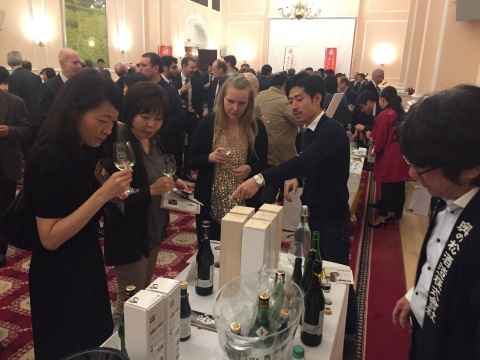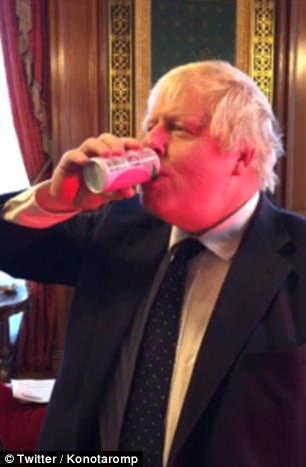Japanese Government won’t stop at anything to promote Fukushima’s contaminated produce to its people so as to calm their fears and to the foreign markets so as to make them lift their imports restrictions on Eastern Japan produce.
Boris Johnson downs a can of peach juice from Fukushima given to him by Japanese minister to prove goods from the nuclear meltdown zone are safe
Boris Johnson was handed Fukushima fruit drink by Japanese minister Tarō Kōno
He downed can in three gulps as an act of solidarity, saying: ‘Very good. Mmmh’
Many countries – including the US and China – still ban imports from the area
Nuclear plant in the prefecture suffered huge meltdown after earthquake in 2011
Boris Johnson has downed a can of peach juice from an area of Japan that suffered a triple nuclear meltdown in a bid to show its produce is safe.
The foreign secretary was handed the Fukushima fruit drink by Japanese foreign affairs minister Tarō Kōno, who brought it with him on his visit to London.
A nuclear plant in the prefecture suffered a huge meltdown after an earthquake in 2011, causing a release of radioactive material that led to over 50 countries banning imports of food from the area.
The foreign secretary was handed the Fukushima fruit drink by Japanese foreign affair minister Tarō Kōno, who brought it with him on his visit to London. Pictured: He downs the can
A nuclear plant in the prefecture suffered a huge meltdown after an earthquake in 2011, causing a release of radioactive material that led to over 50 countries banning imports of food from the area. Pictured: Boris with Kono at the Foreign Office in London yesterday
But Boris didn’t seem to mind as he delightedly gulped down a small can of peach juice, captured on video and published to Twitter by Kōno yesterday.
Smirking after swigging the drink, Boris mutters: ‘Very good… Mmmh.’
He then takes a good look at the can before going for gulp number two.
Again the juice meets his approval, with the foreign secretary declaring: ‘Yum! I need it.’
He then takes a final swig and utters yet another ‘Mmmmh’ before putting the can down, presumably empty.
Kōno explained in his tweet: ‘British FM Boris Johnson drinking peach juice from Fukushima, showing the products from Fukushima are safe.’
Pictured: Boris finishing off the juice
Many countries – including the US and China – still have restrictions on Fukushima produce in place following the disaster
But as part of efforts to persuade the world that the area’s goods are perfectly safe, many Japanese politicians have munched on its food and gulped down its drinks.
In 2011, however, MP Yasuhiro Sonoda rather fluffed the PR exercise by visibly shaking as he drank water collected from the Daiichi nuclear plant in Fukushima.
Boris Johnson swigs can of peach juice from Fukushima
Foreign secretary drinks down gift from Japan’s foreign minister in attempt to show food and drink from region is safe after triple nuclear meltdown
“Yum.” That was foreign secretary Boris Johnson’s verdict on a can of peach juice from Fukushima – a ‘gift’ from his Japanese counterpart, Taro Kono – during their meeting in London this week.
The moment, captured by Kono on his smartphone, was intended to prove that food and drink from Fukushima is safe, almost seven years after the triple nuclear meltdown.
While some countries have maintained restrictions on food from the region – a major producer of peaches – the EU said this month it would ease import restrictions on agricultural items and seafood that were introduced after the March 2011 disaster.
More than 50 countries and regions imposed import curbs on Japanese produce after the disaster, and about half – including China and the US – still have them in place.
“Very good … Mmm,” Johnson pronounced, studying the label on the can for good measure.
He polished off the sweet drink without incident, no doubt to the relief of his Japanese guests. But attempts by other politicians to use food and drink to prove a point, or simply ingratiate themselves with voters, have left a bitter taste.
During a BSE scare in Britain in 1990, the then agriculture secretary, John Gummer, unsuccessfully tried to feed his four-year-old daughter, Cordelia, a burger made with British beef.
In recent years, Ed Miliband and Theresa May proved that encounters with the food of the masses – in his case a bacon sandwich, in hers a cone of chips – are best kept out of the public eye.
May’s predecessor, David Cameron, had set a poor example by choosing to tackle a simple hot dog with a knife and fork.
Japanese politicians of all stripes have taken up the cause of Fukushima produce.
In 2011 Yasuhiro Sonoda, then a ruling party MP, visibly shook as he gulped down a glass of decontaminated – and perfectly safe – water collected from inside two reactor buildings at Fukushima Daiichi.









